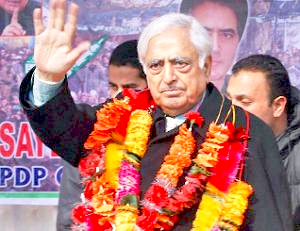New Delhi, Feb 27: PDP patron Mufti Mohammed Sayeed today met Prime Minister Narendra Modi ahead of the swearing-in of the PDP-BJP alliance government on Sunday that will see him return as Jammu and Kashmir Chief Minister.
 The meeting comes after the BJP and PDP reached a consensus on a Common Minimum Programme (CMP) that will form the basis of their unique coalition government in Jammu and Kashmir.
The meeting comes after the BJP and PDP reached a consensus on a Common Minimum Programme (CMP) that will form the basis of their unique coalition government in Jammu and Kashmir.
Sayeed, who arrived here last evening, met the Prime Minister at his residence to give finishing touches to the cabinet that would be sworn-in along with Sayeed on Sunday.
The new alliance government is unique as the BJP, which secured 25 seats in the Assembly elections, will be part of the government in the sensitive state.
The swearing-in function will be held in Jammu where Governor N N Vohra will administer oath to Sayeed, who is returning as Chief Minister after a gap of more than nine years.
He was earlier Chief Minister of the state in alliance with Congress from November 2002 to November 2005.
Sayeed is likely to invite Modi for the swearing-in function in Jammu which will be held at Zorawar auditorium.
A former Union Home Minister in V P Singh government, which was supported by the BJP from outside in 1989, Sayeed has refused to comment on controversial issues like Article 370, revoking of Armed Forces Special Powers Act, rehabilitation of West Pakistan Refugees and talks with separatists.
"I won't talk on the issues....it (CMP) will come in black and white and the entire public of the country will see what we are doing," he had said last evening after his arrival here.
Ahead of the meeting between Sayeed and Modi, Presidents of both the parties -- Mehbooba Mufti of PDP and Amit Shah of BJP, met here on Wednesday after which they announced formation of a coalition government in the state.
While Shah had tweeted after the meeting that "glory will be restored in the 'Jewel of the Crown', BJP-PDP Govt will take J and K to new heights by ensuring good governance and development", Mehbooba had said that this government was not for power sharing but to "win hearts and minds of the people of the state".
The December 23 election results saw a highly-fractured mandate with PDP emerging as single largest party with 28 MLAs followed by BJP with 25. Erstwhile allies National Conference and Congress ended with 15 and 12 seats respectively.






Comments
Add new comment